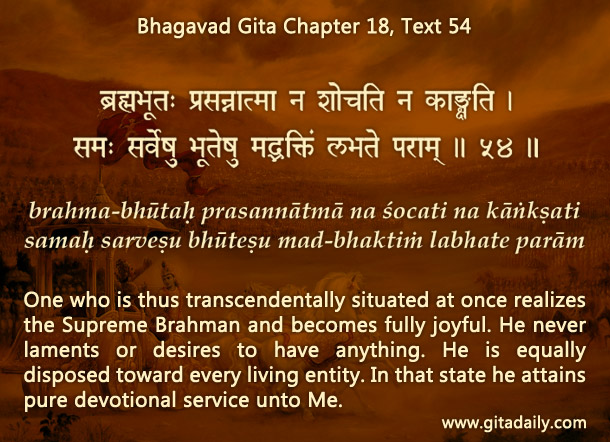Some impersonalists say, “Enlightenment terminates devotion. As long as we are conditioned and are habituated to thinking about forms, we can conceive the Absolute Truth as having form and cultivate devotion to him. But when we become enlightened, we will realize that we are ourselves God and will go beyond devotion.”
Such thinking appeals to the ego because the ego wants to be the greatest and God is the greatest being. However, devotion-terminating conceptions of enlightenment are actually unenlightened conceptions because they contradict scripture and misdiagnose our innermost longing: our longing for love.
Seekers on becoming enlightened don’t give up devotion, but upgrade it to pure devotion.
To gain a sense of scriptural testimony on this subject, consider for example the Bhagavad-gita’s consistent description of the enlightened. It (07.19) declares that the enlightened (jnanavan) surrender to Krishna, understanding him to be everything. The Gita’s philosophy illumines the import of “everything” when applied to Krishna – he is the highest embodiment of everything we aspire for in our quest for beauty, love and joy. No wonder seekers on becoming enlightened don’t give up devotion, but upgrade it to pure devotion.
The Gita (18.54) reiterates this post-enlightened status of pure devotion. The preceding verses (18.49-53) delineate how a jnana-yogi practices and progresses towards enlightenment. This verse (18.54) describes the enlightened: they are equipoised towards all things and all people. Then it concludes by declaring that those thus enlightened attain pure devotion to Krishna.
Gita wisdom explains that our longing for love and the concomitant attraction to form are natural, not delusional. Our present attraction to worldly forms is a misdirection from attraction to Krishna’s all-attractive form. Enlightenment removes the various impurities that cause this misdirection. So, the enlightened devote themselves to Krishna in his personal manifestation because they find him naturally, sublimely, irresistibly attractive.
Thus, enlightenment leads to not the termination of devotion, but its elevation to pure devotion.
Explanation of article:


Some articles on this website contain very logical connections between verses that help us take a stance on the philosophical conclusions of Bhagavad Gita. This article is a masterpiece and I have bookmarked it.